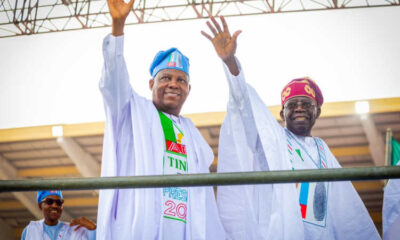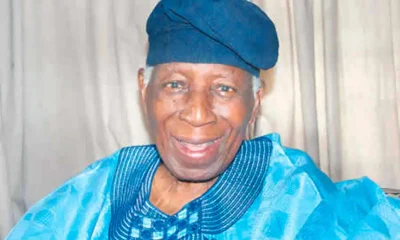News
NLC to IMF: You‘re behind Nigeria’s economic woes

Nigeria Labour Congress, NLC, has dismissed the International Monetary Fund, IMF, denial of any role in Nigeria government’s removal of petrol subsidy and the implementation of other anti-people economic policies, insisting that the body is behind the country’s economic woes.
According to the NLC, the IMF and its cousin in economic mischief – the World Bank remain the twin forces that have a longstanding pattern of recommending harsh and unworkable economic policies to developing nations.
I lost my hands, girlfriend, dad’s landed properties survived depression; but I’m alive’0:00 / 0:00
In a statement yesterday, the President of NLC, Joel Ajaero, urged the World Bank and IMF to remove their knees from our necks so that we can breathe as a nation.
The statement reads: “Nigeria Labour Congress (NLC) believes that it is cynical and indeed typical of the International Monetary Fund’s (IMF) to recently deny responsibility for the Nigerian government’s removal of petroleum subsidy.
“IMF and its cousin in economic mischief – the World Bank remains the twin forces that have longstanding pattern of recommending harsh and unworkable Economic policies to developing nations. In their usual subterfuge, they have continued to present these advisories as growth strategies but which have unfortunately often led to increased socioeconomic hardship and stagnation in Nigeria and other nations that have had the misfortune of drinking their poisoned chalice.
“At a press conference during the IMF and World Bank Annual Meetings in Washington DC, United States, Abebe Selassie, IMF’s African Region Director, described the decision to remove fuel subsidy by Nigeria’s government as a domestic one.
“IMF’s recent statement is a display of subterfuge and evasion. This denial of involvement in Nigeria’s subsidy removal, coupled with the assertion that it was a “domestic decision,” disregards the extensive influence that the IMF wields in policy formation within many developing countries. Despite this assertion, the IMF’s policy dialogues often suggest subsidy cuts as necessary steps toward fiscal sustainability.
“For Nigeria, where successive governments have frequently yielded to these recommendations, the IMF’s disavowal rings hollow, as it underplays the fund’s direct impact on the nation’s economic policies.
“The NLC has become more worried over this denial at this time which is another signpost of the already disturbing policies by the Nigerian government at the behest of the IMF and World Bank and which IMF is now trying to distance itself.
“It shows that the institution is working very hard to stay away from the blame or the backlash that its policy directions will bring in the future. IMF must know that Nigerians are not fools and we are always aware of the destructive influences its awful policy paths for Nigeria and indeed Africa has been.
“It is pretentious and truly too late to begin to deny complicity because we warned the government about the consequences of implementing IMF and World Bank-driven policies.
As IMF and World Bank continue to pretend not to know the apparent obviousness of the social costs of its policy recommendations another layer of concern is added to the entire denial.
“While the IMF acknowledges the “significant social costs involved,” it casually suggests that governments can mitigate these hardships through its idea of expanded social protections which is a system that beggars the people forcing them to dwell on handouts in this case RICE that never gets to the people. The reality in Nigeria has continued to reveal a profound disconnect – subsidy removal and price hikes have pushed essential goods beyond the reach of many, with government-provided social safety nets remaining woefully inadequate.
“This gap between IMF recommendations and the lived experiences of Nigerians highlights a
fundamental and deliberate oversight in the fund’s approach to economic policy.
“In distancing itself from Nigeria’s subsidy removal, the IMF also demonstrates an unsettling inconsistency in its advice to developing nations. It has repeatedly pressured Nigeria to undertake austerity measures, only to distance itself from the results when these recommendations bring hardship to the populace.
“This shifting narrative not only undermines the IMF’s credibility but also raises questions about the sincerity and reliability of its economic prescriptions for third-world nations. The IMF’s insistence that Nigeria is in full control of its economic policies stands in stark contrast to its historical and continued influence, which has often been accompanied by economic turmoil and hardship.
“NLC emphasizes the need for Nigeria and other developing countries to reclaim their economic sovereignty, resisting externally imposed policies that fail to consider local contexts and the needs of the masses.
“The NLC’s stance reflects a broader frustration with the World Bank and IMF’s recurring interventions, which prioritize fiscal metrics over social welfare. By advocating for policies that genuinely benefit Nigerians, we challenge the IMF’s influence and underscore the importance of economic autonomy in building a just, sustainable future.
“This once again is a powerful reminder to our leaders of the impact of international financial institutions on our people and the need to be circumspect in walking their path. “The IMF’s denial of involvement in Nigeria’s subsidy removal rings hollow, considering its decades-long history of recommending
similar austerity measures.
“We hope that our Economic handlers have learnt or are learning the appropriate lessons to sufficiently know that when “shit hits the fan”, IMF and World Bank will wash its hands off and leave the Government carrying the burden and holding the wrong end of the stick. “Nigeria must pursue policies that reflect the real needs of our citizens prioritize economic policies that drive growth, social welfare, and equity, not austerity measures that lead to further economic quagmire and social unrest.
“Once again, we call on the World Bank and IMF to remove their knees from our necks so that we can breathe as a nation. They have become the major problem we have as a nation and we may be forced to soon demand that they leave Nigeria entirely as their policies have continued to undermine our Economy and sabotage the people and the nation.
“IMF should not worry for we know that the Petrol price hike and the Electricity tariff hikes were domestic decisions but we also know that it is a case of “Esau’s Hands but Jacob’s voice”. IMF should not present itself cowardly but should stand up and own up! That is what is called honesty and transparency which is
the bedrock of IMF’s much-vaunted institutional integrity!”
News
Chelsea, Brentford shares the spoil in premier league’s goalless draw

Chelsea’s frustrations on the road continued on Sunday as they played out a drab 0-0 draw against Brentford in the Premier League. The fourth-placed Blues, desperate to solidify their position in the race for Champions League qualification, delivered another uninspiring display under manager Enzo Maresca. Much of the attention was focused on the decision to bench England forward Cole Palmer for almost an hour, sparking questions about the Italian boss’s priorities ahead of a crucial UEFA Conference League quarter-final clash with Legia Warsaw on Thursday. When Palmer was finally introduced, his impact was muted, with his only significant contribution being a missed chance over the crossbar.
Chelsea have a UEFA Conference League quarter-final trip to Legia Warsaw on Thursday, but Maresca’s priorities were questioned following the Blues’ insipid display.
The match itself offered little excitement, highlighting the struggles of both sides. Brentford, battling their own challenges of form at home, seemed unable to capitalize on Chelsea’s sluggish performance. Despite the Blues’ attempts to gain control, Maresca’s cautious tactical approach failed to generate clear-cut opportunities for his team. With Chelsea winless away from home in the league since December, the encounter at the Brentford Community Stadium was emblematic of their recurring troubles on the road. Fans and analysts alike questioned whether Maresca’s approach was adequate for a team still fighting for Champions League qualification amid an increasingly competitive field.
The spotlight on Cole Palmer’s absence from the starting lineup was another defining feature of the match. The England forward, widely regarded as a key player for Chelsea this season, could have provided the creativity and attacking edge the Blues sorely lacked throughout the game. Maresca’s decision to hold Palmer back drew criticism, especially given the urgency of securing vital points for Chelsea’s league ambitions. When Palmer did make his long-awaited entrance, the young star struggled to find his rhythm, leaving fans disappointed and underscoring the broader issues in Chelsea’s attacking play.
With Manchester City breathing down Chelsea’s neck in the Premier League standings, the stakes for Sunday’s result were high. The goalless draw opened the door for fifth-placed City to overtake Chelsea should they secure a win against Manchester United in the day’s late fixture. For the Blues, the outcome not only added pressure to their domestic campaign but also cast a shadow over their upcoming Europa Conference League clash. Maresca now faces the dual challenge of rejuvenating Chelsea’s confidence in Europe while addressing their league form, which could ultimately determine their fate in the pursuit of Champions League football next season.
Top copy trading platform
Discover the best copy trading platform. Copy expert traders’ strategies on Deriv cTrader.
Deriv.com
by TaboolaSponsored Links
The result also extended Brentford’s struggles at home, as they continued their winless streak in front of their fans. Both teams leave the match with unanswered questions about their form, tactics, and aspirations as the Premier League season enters a critical phase. For Chelsea, the disappointment underscores the need for decisive action from Maresca and his squad as they prepare for crucial fixtures on both domestic and continental fronts. Brentford, meanwhile, will aim to regroup and find ways to regain momentum in their remaining matches. The uneventful encounter serves as a reminder of the challenges faced by teams vying to navigate the pressure of top-flight football.
News
“How we imortalised Olunloyo before his death-Makinde

By Kayode Sanni-Arewa
Governor of Oyo State, Seyi Makinde has said he is happy that former governor of the State, Omololu Olunloyo was imortalised before his demise.
Makinde, in a condolence message by his media aide Sulaimon Olanrewaju on Sunday, said the country had lost a patriotic leader, an icon and one of its most cerebral former administrators with the politician’s demise.
The governor said it is sad that the late mathematical guru and administrator passed away before his 90th birthday.
“This death hits differently because I was looking forward to Baba’s 90th birthday, which would have come up on April 14. However, we have to submit to the will of God, who gives and takes lives as He wills.
“My joy is that our government immortalised and honoured Pa Olunloyo in his lifetime and he was present to witness it as we named the Ibadan Airport Road and the Leisure Park on the axis after him in recognition of his service to the state.
“May the Lord grant repose to his soul and give his family the fortitude to bear his demise,” Mr Makinde said.
The death of Mr Olunloyo was confirmed on Sunday morning through a statement by his family.
The deceased died just a few days before his 90th birthday, according to the statement.
News
Iran turns down Trump’s call for direct nuclear talks

Iran’s top diplomat has rejected direct negotiations with the United States as pointless, his office said Sunday, after US President Donald Trump said he preferred face-to-face talks over its nuclear programme.
Trump sent a letter to Iran’s supreme leader Ayatollah Ali Khamenei last month calling for negotiations but warning of military action if diplomacy failed.
On Thursday, the US president said he favoured “direct talks”, arguing they were “faster” and offered a better understanding than going through intermediaries.
But Iranian Foreign Minister Abbas Araghchi said direct talks made no sense with a country “that constantly threatens to resort to force in violation of the UN Charter and that expresses contradictory positions from its various officials”.
“We remain committed to diplomacy and are ready to try the path of indirect negotiations,” he was quoted as saying in a statement issued by his ministry.
Iran keeps itself prepared for all possible or probable events, and just as it is serious in diplomacy and negotiations, it will also be decisive and serious in defending its national interests and sovereignty.”
On Saturday, Iranian President Masoud Pezeshkian said his country was willing to engage in dialogue with the United States on an “equal footing”.
He also questioned Washington’s sincerity in calling for negotiations, saying “if you want negotiations, then what is the point of threatening?”
Iran and the United States have had no diplomatic relations since shortly after the 1979 Islamic Revolution with some regional countries like Oman playing a mediating role between the two sides.
Letter diplomacy
Trump’s letter was delivered to Iran via the United Arab Emirates, and Tehran responded at the end of March via the Sultanate of Oman.
On Sunday, the chief of staff of the Iranian armed forces, General Mohammad Bagheri, said Iran’s response stressed that “we seek peace in the region”.
“We are not the ones who start wars, but we will respond to any threat with all our might,” he said of the content of Iran’s response.
Western countries, led by the United States, have for decades accused Tehran of seeking to acquire nuclear weapons.
Iran rejects the allegation and maintains that its nuclear activities exist solely for civilian purposes.
In 2015, Iran reached a landmark deal with the permanent members of the UN Security Council, namely the United States, France, China, Russia, and the United Kingdom, as well as Germany, to limit its nuclear activities.
The 2015 agreement — known as the Joint Comprehensive Plan of Action — gave Iran sanctions relief in exchange for curbs on its nuclear programme to guarantee that Tehran could not develop a nuclear weapon.
In 2018, during Trump’s first term in office, the United States withdrew from the agreement and reinstated biting sanctions on Iran.
A year later, Iran began rolling back on its commitments under the agreement and accelerated its nuclear programme.
On Monday, Ali Larijani, a close adviser to Khamenei, warned that while Iran was not seeking nuclear weapons, it would “have no choice but to do so” in the event of an attack against it.
-

 Politics12 hours ago
Politics12 hours agoTinubu Gives Fani Kayode, Others New Appointments (See Full List)
-

 News12 hours ago
News12 hours agoDANGER! Ex-Soldier Abubakar Affan Vows to Kill VeryDarkMan ‘Like Deborah Samuel’
-

 News15 hours ago
News15 hours agoWhy NYSC maybe extended by FG- Minister
-

 News15 hours ago
News15 hours agoIbas moves to rehabilitate damaged Rivers LG secretariats
-

 News12 hours ago
News12 hours agoJust in: Ex-Oyo governor, Olunloyo is dead
-

 News15 hours ago
News15 hours agoWike commissions another solar-powered market in Abuja
-

 Economy14 hours ago
Economy14 hours agoCrude prices slump to $65 first time since 2021
-

 Economy15 hours ago
Economy15 hours agoCBN allocates $197.71m into FX market to support naira






